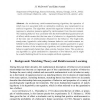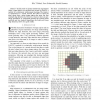1235 search results - page 70 / 247 » Reinforcement learning in a nutshell |
ECAL
2005
Springer
15 years 4 months ago
2005
Springer
An evolutionary reinforcement-learning algorithm, the operation of which was not associated with an optimality condition, was instantiated in an artificial organism. The algorithm ...
CEC
2008
IEEE
15 years 5 months ago
2008
IEEE
— In this article we present results from experiments where a edge detector was learned from scratch by EANT2, a method for evolutionary reinforcement learning. The detector is c...
IROS
2007
IEEE
15 years 4 months ago
2007
IEEE
Abstract— The goal of developing algorithms for programming robots by demonstration is to create an easy way of programming robots that can be accomplished by everyone. When a de...
COLT
2004
Springer
15 years 3 months ago
2004
Springer
Abstract. We consider Reinforcement Learning for average reward zerosum stochastic games. We present and analyze two algorithms. The first is based on relative Q-learning and the ...
ICANN
2001
Springer
15 years 3 months ago
2001
Springer
Unlike traditional reinforcement learning (RL), market-based RL is in principle applicable to worlds described by partially observable Markov Decision Processes (POMDPs), where an ...


